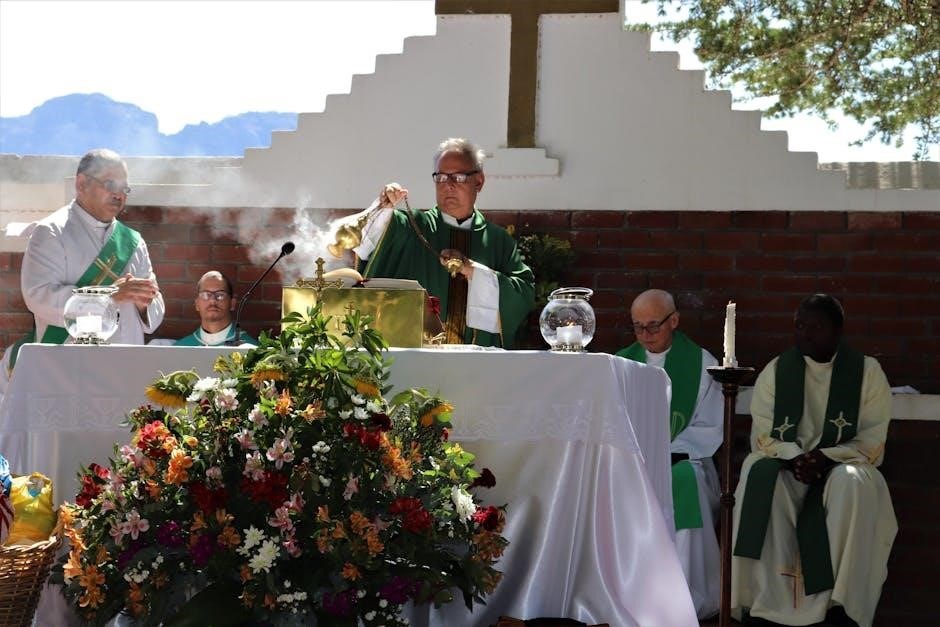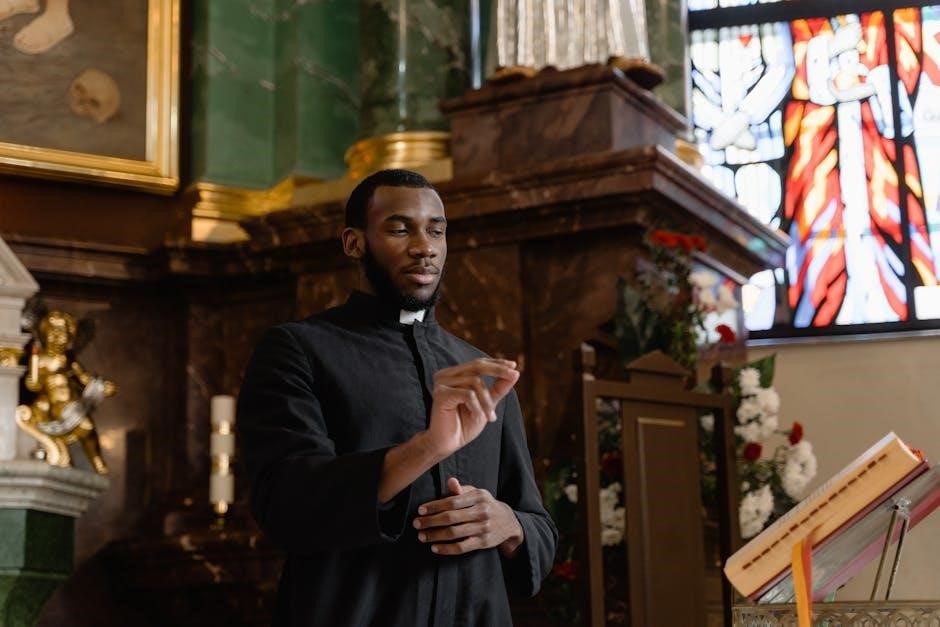
-
By:
- collin
- No comment
deacons pdf
Deacons are ordained church officers who serve as vital members of religious communities, focusing on service, support, and spiritual growth. Their role is rooted in biblical teachings and has evolved over centuries to meet the needs of modern congregations. Deacons play a crucial part in maintaining church functions, fostering fellowship, and addressing the spiritual and practical needs of believers. Their dedication ensures the smooth operation of religious activities and community outreach programs.
1.1 Definition and Role of Deacons
Deacons are ordained ministers in Christian churches who serve as servants of the congregation, focusing on acts of compassion, worship, and administrative support. Their primary role is to embody the principles of servanthood, as modeled by Jesus Christ, and to ensure the spiritual and practical needs of the church community are met. Deacons are not merely assistants but are called to a distinct ministry that complements the work of pastors and elders.
The role of deacons is multifaceted, involving both spiritual and practical responsibilities. They often lead in worship services, assist with the administration of sacraments, and provide pastoral care to members. Additionally, deacons are entrusted with managing the church’s resources, overseeing outreach programs, and ensuring the church remains a place of hospitality and inclusion. Their work is rooted in the biblical mandate to care for the vulnerable and to promote unity within the body of Christ.

In many traditions, deacons also serve as a bridge between the church and the community, engaging in ministries of mercy and advocacy. They are expected to model a life of integrity, humility, and faithfulness, inspiring others to live out their Christian calling. Ultimately, the role of deacons is to enable the church to fulfill its mission by addressing both the spiritual and temporal needs of its members and the wider community.
1.2 Historical Significance of Deacons
The office of deacons holds profound historical significance, tracing its origins to the early Christian Church. The establishment of deacons is first recorded in the New Testament, specifically in Acts 6:1-6, where the apostles appointed seven men to oversee the distribution of resources to widows and the needy. This act marked the formal beginning of the diaconate as a recognized ministry within the church.
Historically, deacons were essential in maintaining the unity and functionality of the church. They served as intermediaries between the clergy and laity, addressing practical needs while fostering spiritual growth. In the early centuries, deacons played a vital role in caring for the poor, the sick, and the marginalized, embodying the compassion of Christ in tangible ways.
During the Middle Ages, the role of deacons evolved, becoming more integrated into the hierarchical structure of the church. They continued to serve as assistants to bishops and priests, while also managing church properties and overseeing charitable works. The diaconate remained a vital part of church life, ensuring that the physical and spiritual needs of the congregation were met.
The Reformation period brought renewed attention to the biblical roots of the diaconate, with Protestant churches often reemphasizing the role of deacons in community service and outreach. Throughout history, the office of deacons has remained a testament to the church’s commitment to serving others and upholding the principles of love, mercy, and justice.

1.3 Importance of Deacons in Modern Religious Contexts
In contemporary religious settings, deacons remain indispensable for fostering spiritual growth, community engagement, and practical support. They serve as a bridge between the clergy and the congregation, ensuring that the needs of the faithful are addressed. Deacons are instrumental in organizing and leading various ministries, such as prayer groups, Bible studies, and outreach programs, which strengthen the spiritual fabric of the church.
Modern deacons are also pivotal in addressing societal challenges, such as poverty, inequality, and social injustice. By initiating and managing community service projects, they embody the teachings of Christ and demonstrate compassion to those in need. Their efforts not only uplift individuals but also enhance the church’s visibility and relevance in the community.
Furthermore, deacons play a vital role in leadership and administration within the church. They often assist in planning and executing events, managing budgets, and overseeing church facilities. Their organizational skills ensure the smooth operation of religious activities, allowing the clergy to focus on pastoral duties. This dual role of spiritual and administrative support underscores their importance in modern religious contexts.
In an increasingly secular world, deacons serve as a reminder of the church’s commitment to service and faith. They inspire believers to live out their faith actively, fostering a sense of belonging and purpose within the congregation. By addressing both spiritual and practical needs, deacons ensure that the church remains a vibrant and caring institution in the modern era.

Historical Background of Deacons
Deacons trace their origins to the early Christian Church, established to address practical needs and ensure equitable care for believers. Rooted in the New Testament, their role expanded over centuries, adapting to the evolving needs of the Church while maintaining their core mission of service, support, and spiritual guidance. Their historical development reflects their enduring importance in religious traditions.

2.1 The Origins of Deacons in the Early Christian Church
The origins of deacons can be traced back to the early Christian Church, where the role emerged as a response to the growing needs of the burgeoning faith community. In the New Testament, specifically in Acts 6, the apostles faced a challenge in managing the distribution of resources among believers, leading to the appointment of seven men to oversee these practical matters. These individuals, including Stephen and Philip, were chosen for their integrity, faith, and wisdom, marking the establishment of the diaconate as a distinct office within the Church.
The early deacons were tasked with addressing both spiritual and practical concerns, ensuring that the widows and needy members of the congregation were cared for. This role not only alleviated the apostles’ workload but also allowed them to focus on preaching and teaching. The deacons’ responsibilities extended beyond administrative duties, as they also engaged in preaching and evangelism, spreading the message of Christ beyond Jerusalem.
The appointment of deacons in Acts 6 highlights the importance of servant leadership in the early Church. It demonstrated a commitment to equity, compassion, and organizational efficiency, setting a precedent for the role of deacons in subsequent centuries. The early deacons’ ability to balance spiritual and practical responsibilities laid the foundation for their enduring significance in Christian communities.
2.2 The Role of Deacons in the New Testament
The New Testament provides clear insights into the role of deacons, highlighting their importance in the early Christian Church. Originating from the Greek word diakonos, meaning “servant” or “minister,” deacons were entrusted with specific responsibilities to support the spiritual and practical needs of the congregation. Their role was first formally established in Acts 6, where seven men were appointed to oversee the distribution of resources to widows and the needy, ensuring fairness and equity within the growing church.

In the New Testament, deacons were not only servants to the physical needs of believers but also played a role in spiritual leadership. For example, Stephen, one of the first deacons, is described as “a man full of faith and the Holy Spirit,” who preached the gospel and performed miracles. Similarly, Philip, another deacon, is noted for his evangelistic efforts, spreading the message of Christ beyond Jerusalem. This dual focus on service and spirituality defined the deacon’s role in the early Church.
The qualifications for deacons are also outlined in the New Testament. In 1 Timothy 3:8-13 and Titus 1:6-9, Paul emphasizes the importance of moral integrity, faithfulness, and a blameless reputation. Deacons were expected to be humble, honest, and dedicated to their faith, serving as examples of Christian character within their communities. Their role was not limited to administrative tasks but extended to fostering unity, providing care, and upholding the teachings of the apostles.
2.3 Evolution of the Deaconate Through the Centuries
The role of deacons has undergone significant transformations since its inception in the early Christian Church. In the first few centuries, deacons served as prominent leaders, assisting bishops and overseeing the distribution of resources to the needy. By the 2nd century, the deaconate had become a formal office, with deacons playing a crucial role in the liturgical and administrative life of the Church.
During the Middle Ages, the role of deacons evolved further, becoming closely tied to the clerical hierarchy. In the Roman Catholic Church, the diaconate became a stepping stone toward priesthood, with deacons serving as assistants to bishops and priests. This shift emphasized their liturgical responsibilities over their original focus on service to the poor. In contrast, Eastern Orthodox traditions maintained a stronger emphasis on the deacon’s role in both liturgy and community service.
The Protestant Reformation brought significant changes to the deaconate. Many Protestant denominations rejected the hierarchical structure of the Catholic Church, leading to the deaconate being redefined in a more congregational context. Deacons in Protestant churches often focused on practical ministries, such as overseeing benevolence, managing church finances, and coordinating community outreach programs. This reorientation aligned with the Reformation’s emphasis on the priesthood of all believers.
In modern times, the deaconate continues to adapt to the needs of contemporary congregations. Many churches have expanded the role of deacons to include leadership in worship, discipleship, and mission efforts. Despite these changes, the core principles of service, compassion, and spiritual integrity remain central to the deaconate. This evolution reflects the dynamic nature of the Church and its ongoing commitment to serving both God and humanity.

Roles and Responsibilities of Deacons
Deacons are entrusted with diverse responsibilities, including spiritual leadership, community service, and administrative support. They provide guidance to congregants, coordinate outreach programs, and assist in worship services. Deacons also manage church resources, facilitate decision-making processes, and ensure the smooth operation of ministries. Their role is pivotal in fostering a sense of community and upholding the mission of the church.
3.1 Spiritual Leadership and Guidance
Deacons play a vital role in providing spiritual leadership and guidance within their congregations. They are often seen as intermediaries between the church leadership and the members, ensuring that the spiritual needs of the community are met. Their responsibilities include teaching biblical principles, mentoring believers, and offering prayer and counsel to those seeking guidance.
One of the key aspects of their spiritual leadership is fostering a deeper understanding of faith among church members. Deacons often lead Bible studies, devotionals, and small group discussions, creating opportunities for spiritual growth. They also serve as role models, demonstrating a life of integrity, humility, and compassion, which inspires others to follow Christ more faithfully.

In addition to individual guidance, deacons are involved in corporate worship, assisting with sacraments and liturgies. They help create an atmosphere of reverence and unity during services, ensuring that the congregation remains focused on worship and spiritual renewal. Their presence also provides comfort to those experiencing challenges, offering a sense of stability and hope.
Moreover, deacons are often tasked with identifying and addressing spiritual needs within the church. They work closely with pastors and other leaders to develop ministries that equip believers for service and strengthen their faith. By providing spiritual leadership and guidance, deacons help foster a vibrant and mature Christian community, enabling members to live out their faith effectively in daily life.
In essence, the spiritual leadership of deacons is foundational to the health and growth of a church. Their commitment to nurturing the spiritual well-being of others ensures that the congregation remains grounded in biblical truths and empowered to serve Christ faithfully.
3.2 Community Service and Outreach Programs
Deacons are deeply involved in community service and outreach programs, reflecting their commitment to serving others and spreading the message of love and compassion. These initiatives are designed to address the physical, emotional, and spiritual needs of both church members and the broader community. Deacons often organize and participate in activities such as food drives, clothing distributions, and disaster relief efforts, demonstrating their dedication to caring for the vulnerable.
One of the key roles of deacons in outreach is to connect the church with the local community. They frequently collaborate with other church leaders and volunteers to develop programs that meet specific needs, such as tutoring for children, support for the elderly, or assistance for the homeless. By engaging in these efforts, deacons embody the biblical mandate to “serve one another in love” and to be the hands and feet of Christ in the world.
Deacons also play a crucial role in fostering unity and cooperation within the church by encouraging members to participate in outreach initiatives. They often serve as liaisons between the church and external organizations, ensuring that resources are used effectively and that efforts are coordinated for maximum impact. Their involvement in community service not only benefits those being served but also strengthens the church’s witness and reputation in the community.
Moreover, deacons are instrumental in identifying and addressing unmet needs within the community. They often lead initiatives to educate the congregation about social issues and mobilize resources to address them. Through their efforts, deacons help create a culture of service and compassion, inspiring others to follow their example and live out their faith in practical ways.
3.3 Administrative and Organizational Duties
Deacons are often responsible for the administrative and organizational aspects of church operations, ensuring that the congregation functions efficiently and effectively. These duties may include managing church finances, overseeing maintenance of church facilities, and coordinating logistical arrangements for worship services, events, and outreach programs. Their organizational skills help maintain order and structure within the church, allowing other leaders to focus on spiritual and pastoral responsibilities.
One of the key administrative roles of deacons is to serve as a liaison between the congregation and church leadership. They may assist in planning and executing major church decisions, such as budgeting, hiring staff, or implementing new programs. Deacons are also often involved in scheduling and coordinating the use of church resources, such as meeting spaces, equipment, and volunteers. Their attention to detail and ability to manage multiple tasks ensure that church activities run smoothly.
Additionally, deacons may be responsible for maintaining church records, such as membership rolls, attendance records, and financial ledgers. They may also assist in the development and enforcement of church policies, ensuring that all activities align with the church’s mission and values. By handling these administrative duties, deacons free up other church leaders to focus on teaching, preaching, and pastoral care.
In many churches, deacons also play a key role in organizing and overseeing special events, such as holiday services, weddings, funerals, and community gatherings. They may work closely with other church committees to ensure that these events are well-planned and executed. Their organizational expertise helps create a welcoming and orderly environment for all attendees.
Overall, the administrative and organizational duties of deacons are essential to the effective functioning of the church. Their behind-the-scenes work ensures that the church operates smoothly, allowing the congregation to focus on worship, fellowship, and service to others.

Qualifications and Requirements for Deacons
Deacons must embody strong moral character, integrity, and compassion. They are expected to demonstrate a deep commitment to serving and uplifting the congregation. Deacons should be spiritual role models, exhibiting humility and a willingness to follow God’s teachings. Additionally, they must be reliable, willing to collaborate with others, and respectful of church authority and traditions.
4.1 Spiritual Maturity and Commitment

Spiritual maturity is a cornerstone qualification for deacons, as they are expected to serve as spiritual leaders and role models within the church. This maturity is demonstrated through a deep, personal relationship with God, evidenced by consistent prayer, Bible study, and a life of obedience to His teachings. Deacons must exhibit a strong understanding of scripture and the ability to apply it practically in their lives and ministries.
A spiritually mature deacon is characterized by humility, wisdom, and integrity. They should be individuals who consistently seek to glorify God in all aspects of their lives, displaying fruits of the Spirit such as love, patience, and kindness. Their commitment to spiritual growth is essential, as they are called to guide and support others in their faith journeys.
Moreover, deacons must be fully committed to their faith and willing to serve selflessly. This commitment involves being accountable for their actions, maintaining a reputation of trustworthiness, and demonstrating a willingness to submit to spiritual authority. Their spiritual maturity and commitment serve as the foundation for effectively fulfilling their responsibilities and inspiring others to deepen their relationship with Christ.
4.2 Educational and Training Requirements
The educational and training requirements for deacons vary depending on the denomination, church, or religious organization. However, most traditions emphasize the importance of theological education and practical training to equip deacons for their roles. Many churches require deacons to undergo formal theological studies or participate in specialized training programs.
Typically, deacons are expected to have a solid understanding of scripture, church doctrine, and the principles of ministry. This may involve completing courses in Bible studies, church history, and pastoral care. Some denominations require deacons to attend seminary or participate in lay leadership training programs to prepare them for their responsibilities.
In addition to formal education, practical training is essential. Many churches provide workshops, retreats, and mentorship programs to help deacons develop leadership, communication, and interpersonal skills. These programs often focus on areas such as conflict resolution, community outreach, and financial stewardship.
Some churches also require deacons to participate in ongoing education and professional development to stay informed about current issues and best practices in ministry. This ensures that deacons remain effective and relevant in their service to the church and community.